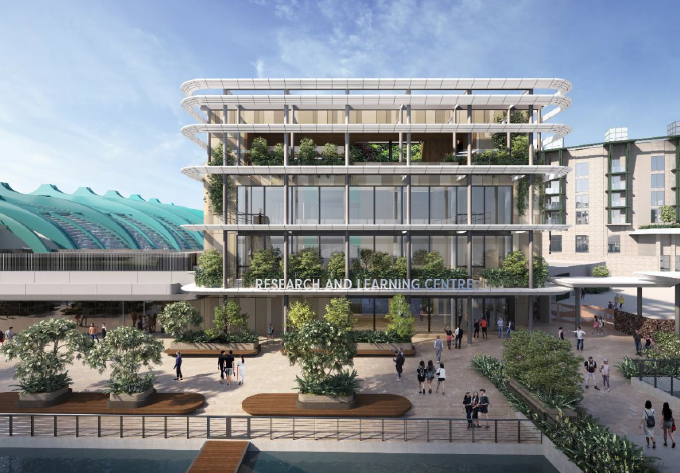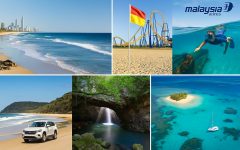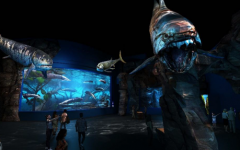 Resorts World Sentosa’s (RWS, 圣淘沙名胜世界) Singapore Oceanarium (新加坡海洋生态馆) is set to launch its state-of-the-art Research and Learning Centre(研究与学习中心) this May 2025. The new centre underscores Singapore Oceanarium’s commitment to becoming the leading hub in Asia for marine biodiversity conservation, marine ecosystem protection and restoration, as well as empowering communities and supporting authorities to drive positive change. As a catalyst for innovation, the centre will advance Singapore Oceanarium’s efforts in education, research and conservation – amplifying its impact and reinforcing its position as a pioneering aquarium-based conservation institution.
Resorts World Sentosa’s (RWS, 圣淘沙名胜世界) Singapore Oceanarium (新加坡海洋生态馆) is set to launch its state-of-the-art Research and Learning Centre(研究与学习中心) this May 2025. The new centre underscores Singapore Oceanarium’s commitment to becoming the leading hub in Asia for marine biodiversity conservation, marine ecosystem protection and restoration, as well as empowering communities and supporting authorities to drive positive change. As a catalyst for innovation, the centre will advance Singapore Oceanarium’s efforts in education, research and conservation – amplifying its impact and reinforcing its position as a pioneering aquarium-based conservation institution.
The Research and Learning Centre is a cornerstone of Singapore Oceanarium. While the new centre marks a bold step forward, it also builds upon more than a decade of foundational work under S.E.A. Aquarium, where education, research and conservation have long been central to its mission, as demonstrated in its species breeding programmes, behavioural research and collaborations with regional and international organisations. The Research and Learning Centre now offers a dedicated facility to expand these efforts, strengthen collaboration and serve as the heart of Singapore Oceanarium’s education programmes and conservation initiatives.
A purpose-built centre for research and marine conservation Certified Green Mark Platinum Zero Energy by Singapore’s Building and Construction Authority (BCA), the centre is purposefully designed with sustainability at its core – supporting RWS’ vision to achieve carbon neutrality by 2030. Its lightweight concrete façade and aluminium shades reduce heat gain and cooling demands, while the use of natural light minimises reliance on artificial lighting. All the building’s energy needs are met entirely by solar power.
Fully equipped with immersive learning labs, collaborative workspaces, seminar rooms and a rooftop event space, the Research and Learning Centre will augment Singapore Oceanarium’s robust educational offerings and provide advanced facilities for scientists and researchers to conduct valuable research work and drive marine science outreach on-site. Its purpose-built facilities include:
• Pacific, Atlantic, Arctic Rooms: Conducive learning space where up to three classrooms can be seamlessly combined to form a larger area for engagement and learning.
• The Wave: Bleacher stairs featuring wide, staggered steps with ample space for sitting and socialising, encouraging group conversations and casual talks in a comfortable, open environment.
• Edutorium: Versatile, multi-functional space with state-of-the-art digital capabilities that can be configured flexibly for lectures, presentations and interactive learning experiences.
• The Beacon: Rooftop event space with panoramic views of the waterfront, providing a vibrant, open-air setting ideal for community gatherings, cocktail receptions, or corporate events.
• Marine Lab: A dynamic learning environment that comprises three distinct areas – a teaching lab that brings together students and educators for marine science programmes; a research lab that welcomes visiting scientists to pursue projects advancing understanding of the ocean; and a wet lab where hands-on experiments turn theory into tangible experience.
The Marine Lab where visiting scientists can contribute to the research of marine life at the Singapore Oceanarium’s Research and Learning Centre.
The Research and Learning Centre will play a pivotal role in supporting both ongoing and new research projects focusing on marine conservation efforts. These include studies on ex-situ coral reproduction in controlled aquarium environments, optimising breeding and culturing methods for threatened marine animals and exploring the genetic diversity of animals under our care. Additionally, the Research and Learning Centre will be a venue for workshops and hands-on training sessions to engage the public through citizen science programmes. Beyond research and conservation, the Research and Learning Centre will be a platform for global collaboration, hosting regional and international conferences that unite like-minded organisations in the shared mission of marine conservation. Notable upcoming events include Bowmouth Guitarfish Population Viability Analysis workshop and Convention on International Trade in Endangered Species of Wild Fauna and Flora (CITES) Global Youth Summit (CGYS).
“As the ocean faces mounting challenges, Singapore Oceanarium’s Research and Learning Centre aims to inspire the next wave of ocean leaders by demonstrating the power of knowledge, collaboration and shared purpose in driving meaningful change. The Research and Learning Centre reflects our ongoing commitment to create a collaborative ecosystem that brings together like-minded partners to turn science into action and advance our efforts in marine conservation, research and education. We hope for this to be a space that combines forces across the ocean community – and beyond – to restore vital marine habitats towards a thriving future for our oceans.” said Ms. Lam Xue Ying, Vice President of Singapore Oceanarium.
Driving global conservation efforts: Upcoming events at the new Research and Learning Centre – Bowmouth Guitarfish (Rhina Ancylostomus) Population Viability Analysis workshop & CITES Global Youth Summit (CGYS)
The Research and Learning Centre will not only function as a dynamic hub for research and education but also as a platform for global conservation dialogue and collaboration. Through strategic partnerships with international associations, the Research and Learning Centre will host high-impact conservation events aimed at uniting experts, institutions and communities in the shared mission to protect and conserve marine biodiversity.
Among these events is the Bowmouth Guitarfish Population Viability Analysis workshop (PVA), an upcoming conservation planning workshop organised by an international coalition called Shark Ray 360, of which Singapore Oceanarium is a member. Among the PVA objectives is identifying strategic actions supporting urgent in-situ and ex-situ conservation efforts of the critically endangered Bowmouth Guitarfish. Held from May 12 to May 14, this workshop will bring together global conservation leaders, including representatives from 15 aquariums (six from United States of America, five in Asia, one in Australia, two in Europe and two in the Middle East), as well as shark and ray experts, government agencies and non-government organisations from all over the world. These conservation leaders include Dr. Rima Jabado, Deputy Chair of the IUCN Species Survival Committee (SSC) and Chair of the IUCN SSC Shark Specialist Group, Dr. Fahmi, National Research and Innovation Agency (BRIN) and co-chair of IUCN Shark Specialist Group and Dr. Steve Kessel, Director of Marine Research, Shedd Aquarium and Co-Chair of Shark Ray 360 Research Working Group.
The Research and Learning Centre will host a workshop on 28 May for the CITES Global Youth Summit (CGYS, 27-31 May 2025) after its Opening Ceremony at Singapore Oceanarium’s Ocean Gallery. The workshop will address the challenges in regulating the trade of marine species. Organised by the CITES Global Youth Network (CGYN) and hosted by the National Parks Board (NParks), the summit will bring together youths from more than 50 countries to foster international collaboration and empower them with knowledge to tackle illegal wildlife trade. The workshop aims to highlight the often-overlooked area of marine wildlife trade and kickstart conversations among international youths about its solutions.
With the launch of the Research and Learning Centre, Singapore Oceanarium is charting a bold course towards a more sustainable future for the oceans. By bridging science, education and community action, the Research and Learning Centre is set to become a beacon for global marine conservation, nurturing the next generation of changemakers, fostering groundbreaking research and uniting international voices in the fight to protect the planet.
 Tourism Breaking News
Tourism Breaking News


